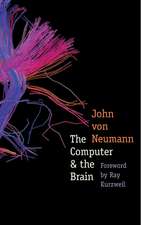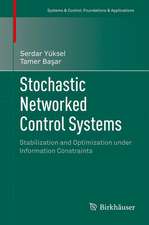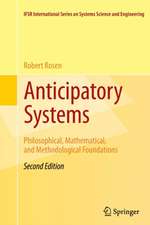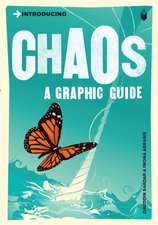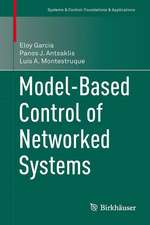Reaction-Diffusion Automata: Phenomenology, Localisations, Computation: Emergence, Complexity and Computation, cartea 1
Autor Andrew Adamatzkyen Limba Engleză Paperback – 15 oct 2014
This book explores a minimalist paradigm of studying reaction-diffusion and excitable media using locally-connected networks of finite-state machines: cellular automata and automata on proximity graphs. Cellular automata are marvellous objects per se because they show us how to generate and manage complexity using very simple rules of dynamical transitions. When combined with the reaction-diffusion paradigm the cellular automata become an essential user-friendly tool for modelling natural systems and designing future and emergent computing architectures.
The book brings together hot topics of non-linear sciences, complexity, and future and emergent computing. It shows how to discover propagating localisation and perform computation with them in very simple two-dimensional automaton models. Paradigms, models and implementations presented in the book strengthen the theoretical foundations in the area for future and emergent computing and lay key stones towards physical embodied information processing systems.
| Toate formatele și edițiile | Preț | Express |
|---|---|---|
| Paperback (1) | 946.72 lei 6-8 săpt. | |
| Springer Berlin, Heidelberg – 15 oct 2014 | 946.72 lei 6-8 săpt. | |
| Hardback (1) | 952.09 lei 6-8 săpt. | |
| Springer Berlin, Heidelberg – 11 sep 2012 | 952.09 lei 6-8 săpt. |
Din seria Emergence, Complexity and Computation
- 8%
 Preț: 397.83 lei
Preț: 397.83 lei - 18%
 Preț: 1132.65 lei
Preț: 1132.65 lei - 20%
 Preț: 651.75 lei
Preț: 651.75 lei - 20%
 Preț: 570.97 lei
Preț: 570.97 lei - 15%
 Preț: 653.33 lei
Preț: 653.33 lei - 15%
 Preț: 648.24 lei
Preț: 648.24 lei - 15%
 Preț: 651.19 lei
Preț: 651.19 lei - 20%
 Preț: 940.98 lei
Preț: 940.98 lei -
 Preț: 392.37 lei
Preț: 392.37 lei - 15%
 Preț: 647.59 lei
Preț: 647.59 lei - 15%
 Preț: 641.71 lei
Preț: 641.71 lei - 15%
 Preț: 645.28 lei
Preț: 645.28 lei - 15%
 Preț: 649.06 lei
Preț: 649.06 lei - 18%
 Preț: 1415.22 lei
Preț: 1415.22 lei - 20%
 Preț: 1304.44 lei
Preț: 1304.44 lei - 20%
 Preț: 1296.18 lei
Preț: 1296.18 lei - 20%
 Preț: 655.35 lei
Preț: 655.35 lei - 15%
 Preț: 648.56 lei
Preț: 648.56 lei - 18%
 Preț: 953.82 lei
Preț: 953.82 lei - 20%
 Preț: 657.02 lei
Preț: 657.02 lei - 18%
 Preț: 1117.03 lei
Preț: 1117.03 lei - 20%
 Preț: 992.26 lei
Preț: 992.26 lei - 15%
 Preț: 656.74 lei
Preț: 656.74 lei - 20%
 Preț: 649.60 lei
Preț: 649.60 lei - 15%
 Preț: 654.43 lei
Preț: 654.43 lei - 20%
 Preț: 661.14 lei
Preț: 661.14 lei - 20%
 Preț: 645.47 lei
Preț: 645.47 lei - 20%
 Preț: 658.19 lei
Preț: 658.19 lei - 20%
 Preț: 644.15 lei
Preț: 644.15 lei - 18%
 Preț: 880.77 lei
Preț: 880.77 lei - 20%
 Preț: 1455.75 lei
Preț: 1455.75 lei - 20%
 Preț: 1158.26 lei
Preț: 1158.26 lei
Preț: 946.72 lei
Preț vechi: 1154.54 lei
-18% Nou
Puncte Express: 1420
Preț estimativ în valută:
181.16€ • 193.72$ • 151.04£
181.16€ • 193.72$ • 151.04£
Carte tipărită la comandă
Livrare economică 18 aprilie-02 mai
Preluare comenzi: 021 569.72.76
Specificații
ISBN-13: 9783642435720
ISBN-10: 3642435726
Pagini: 344
Ilustrații: XIV, 330 p.
Dimensiuni: 155 x 235 x 18 mm
Greutate: 0.48 kg
Ediția:2013
Editura: Springer Berlin, Heidelberg
Colecția Springer
Seria Emergence, Complexity and Computation
Locul publicării:Berlin, Heidelberg, Germany
ISBN-10: 3642435726
Pagini: 344
Ilustrații: XIV, 330 p.
Dimensiuni: 155 x 235 x 18 mm
Greutate: 0.48 kg
Ediția:2013
Editura: Springer Berlin, Heidelberg
Colecția Springer
Seria Emergence, Complexity and Computation
Locul publicării:Berlin, Heidelberg, Germany
Public țintă
ResearchCuprins
Part I Phenomenology and localisations.-
Part II Population dynamics.-
Part III Computation with excitation.
Part II Population dynamics.-
Part III Computation with excitation.
Recenzii
From the reviews:
“This book will attract a wide variety of readers interested in unconventional computing. To a great extent, the continuous keen interest in cellular automata is sustained by speculation that it could effectively reveal the fundamental mechanism of nature.” (Simon Berkovich, Computing Reviews, May, 2013)
“This book will attract a wide variety of readers interested in unconventional computing. To a great extent, the continuous keen interest in cellular automata is sustained by speculation that it could effectively reveal the fundamental mechanism of nature.” (Simon Berkovich, Computing Reviews, May, 2013)
Textul de pe ultima copertă
Reaction-diffusion and excitable media are amongst most intriguing substrates. Despite apparent simplicity of the physical processes involved the media exhibit a wide range of amazing patterns: from target and spiral waves to travelling localisations and stationary breathing patterns. These media are at the heart of most natural processes, including morphogenesis of living beings, geological formations, nervous and muscular activity, and socio-economic developments.
This book explores a minimalist paradigm of studying reaction-diffusion and excitable media using locally-connected networks of finite-state machines: cellular automata and automata on proximity graphs. Cellular automata are marvellous objects per se because they show us how to generate and manage complexity using very simple rules of dynamical transitions. When combined with the reaction-diffusion paradigm the cellular automata become an essential user-friendly tool for modelling natural systems and designing future and emergent computing architectures.
The book brings together hot topics of non-linear sciences, complexity, and future and emergent computing. It shows how to discover propagating localisation and perform computation with them in very simple two-dimensional automaton models. Paradigms, models and implementations presented in the book strengthen the theoretical foundations in the area for future and emergent computing and lay key stones towards physical embodied information processing systems.
This book explores a minimalist paradigm of studying reaction-diffusion and excitable media using locally-connected networks of finite-state machines: cellular automata and automata on proximity graphs. Cellular automata are marvellous objects per se because they show us how to generate and manage complexity using very simple rules of dynamical transitions. When combined with the reaction-diffusion paradigm the cellular automata become an essential user-friendly tool for modelling natural systems and designing future and emergent computing architectures.
The book brings together hot topics of non-linear sciences, complexity, and future and emergent computing. It shows how to discover propagating localisation and perform computation with them in very simple two-dimensional automaton models. Paradigms, models and implementations presented in the book strengthen the theoretical foundations in the area for future and emergent computing and lay key stones towards physical embodied information processing systems.
Caracteristici
Advances hot and widely popular topics of cellular automata, unconventional computing, gliders and solitons and non-linear dynamics Explains complex concepts and models in very simple basic terms, which does not require substantial specialist training Lavishly illustrated with visually attractive examples of cellular automaton configurations, which will appeal not only to scientists but also to artists and general public



